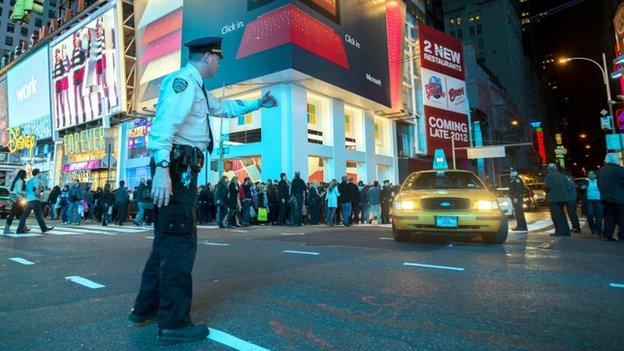Knife crime: Why are we talking about it?
- Published
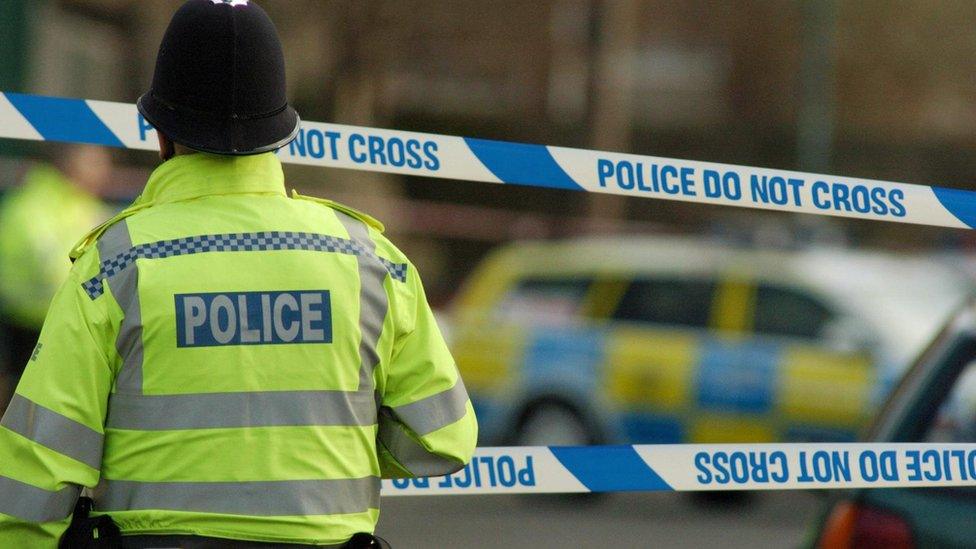
Recently, there has been an increase in violent crime incidents involving knives
Knife crime is a particularly big issue in the news at the moment. This is following a number of recent knife attacks on people, particularly in London.
After falling for several years, the amount of knife crime in England and Wales is rising again. Out of the 44 police forces across the areas, 42 recorded a rise in knife crime since 2011.
Figures released in February showed the number of deaths as a result of knife crime in England and Wales last year was 285 - the highest since records began in 1946.
In November 2018, there were reports that there had been a rise in the number of children under 18 receiving treatment for knife wounds in England, with the number of young victims having increased by 86% in the last four years.
The government has said that it is working to deal with the problem, but a lot of people are angry and say that the problem is not being dealt with effectively.
Although the figures suggest that knife crime is on the increase, it is still relatively unusual for a violent incident to involve a knife - and rarer still for someone to need hospital treatment.
Overall levels of violence (for example, including physical fights) have in fact fallen by about a quarter since 2013.
Why has the amount of knife crime gone up?
There is no one reason to explain this increase.
Many people believe that those who carry knives are simply criminals and that what is needed to stop this behaviour is more police officers on the streets.
In recent years, there has been a decrease in the number of police officers as there has not been as much money available from the government to pay for them.
The UK's top police officer Cressida Dick has said that she believes there is "some link" between falling police numbers and a rise in violent crime.
WATCH: Litty Lightz on his music, London and knife crime (May 2018)
The boss of Thames Valley Police, Chief Constable Francis Habgood, agrees with this, saying it was "common sense" that a reduction in the number of police officers was linked to knife crime.
"If you have got fewer people enforcing the law, [...] able to respond when things happen and investigate things, then of course it is going to have an impact on our ability to deal with issues like knife crime," he said.
He explained that in his eight years as chief constable, he has been required to make cuts of more than £100 million and had lost 1,000 officers and staff.
But earlier this week Prime Minister Theresa May said there is "no direct correlation" between falling officer numbers and a rise in violent crime.
Leader of the Labour Party Jeremy Corbyn said that Mrs May "must start listening" to police chiefs over the impact of cutting 21,000 officers, saying: "You cannot keep people safe on the cheap."
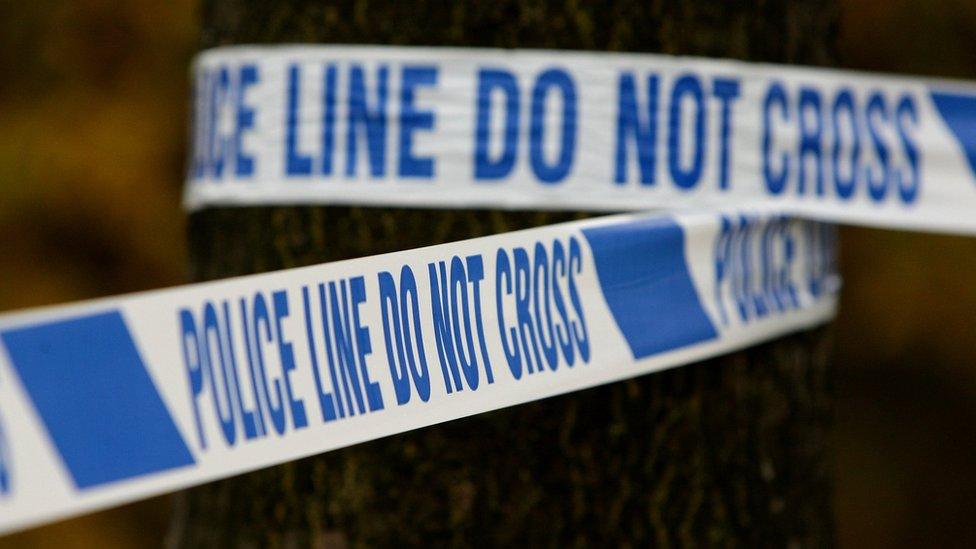
Some experts argue that often it is a fear of gangs and crime that leads to young people carrying knives, because they believe it will help to keep them safe.
The trouble is that those weapons may then be used, which could make the number of violent incidents go up.
In March 2018, police chief Cressida Dick told the Times newspaper that she believed arguments and peer pressure on social media sites can "rev people up", make people angry and make street violence "more likely".
Others say that young people get involved with gangs and knife crime because they lack opportunities in life.
They say there are too few services provided to help and support young people, including education, mental health services and youth centres. They believe that improving these services would help cut the amount of violent crime.
Many of these services have been reduced as a result of the government reducing the money available to spend on these services.
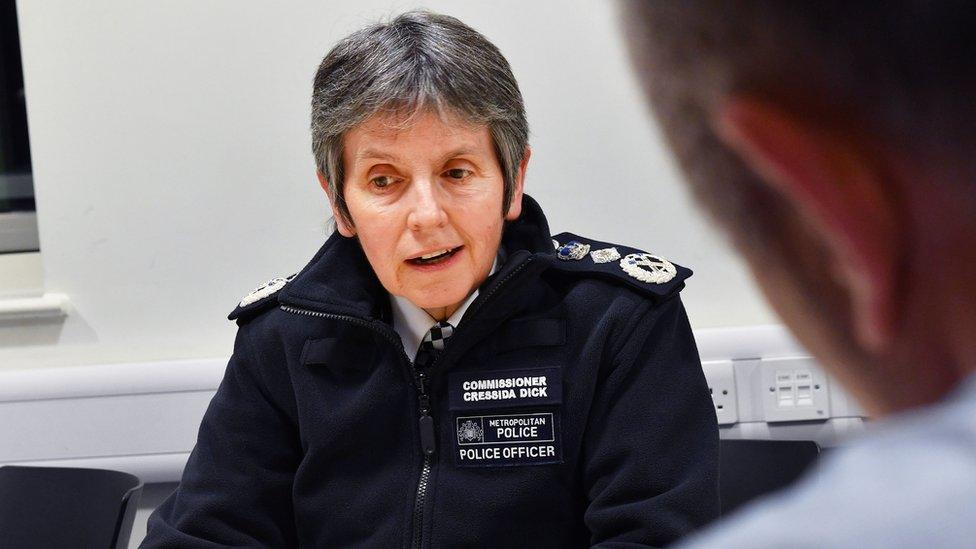
The UK's top police officer Cressida Dick has said that she believes there is "some link" between falling police numbers and a rise in violent crime
What are laws about carrying a knife?
There are lots of different rules about carrying a knife, but for the most part it is illegal to carry a knife in public without a good reason.
It is also illegal to use any knife in a threatening way.
If you are found to be carrying a knife in the UK, there could be serious punishments.
What is stop and search?
One thing that you might have heard being talked about in relation to knife crime is something called 'stop-and-search'.
As the name might suggest, stop-and-search is a police practice in which a police officer can stop a person briefly to check that they are not carrying any weapons or illegal items - for example, a knife.
There are certain things that police are and aren't allowed to do during stop-and-search, and certain things they have to do (for example, show their credentials and tell the person what they suspect them of carrying).
Over the last few years, the use of stop-and-search by police officers has declined.
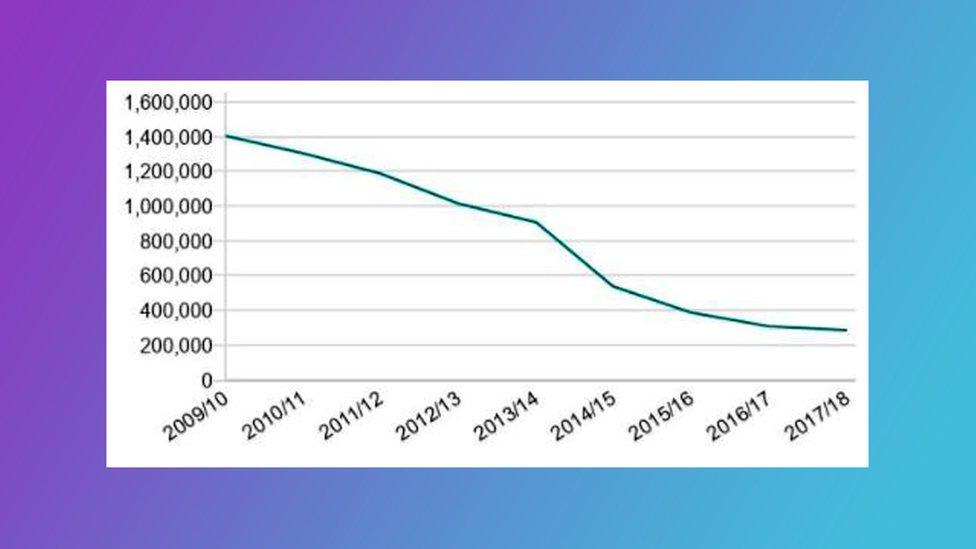
This graph shows the number of stop-and-searches in England and Wales (Figures: Home Office)
The boss of Thames Valley Police, Chief Constable Francis Habgood, has said that the use of stop-and-search in his police force had "considerably" dropped in the last few years, but that he thought it should be used more to deal with the issue of knife crime and young people carrying blades.
Home secretary Sajid Javid told the annual Police Superintendents' Conference in September: "If stop-and-search means that lives can be saved from the communities most affected, then of course it's a very good thing."
But some people have been critical of stop-and-search as they say that ethnic minorities, especially young black men, are unfairly targeted.
What is being done about knife crime?
Following the most recent attacks, Home Secretary Sajid Javid has called for knife crime to be treated "like a disease".
He has met with police bosses to look at ways to deal with the spread of violence.
The prime minister has asked government officials to make dealing with the issue of knife crime a priority and has said she would host a summit "in the coming days" to tackle it.
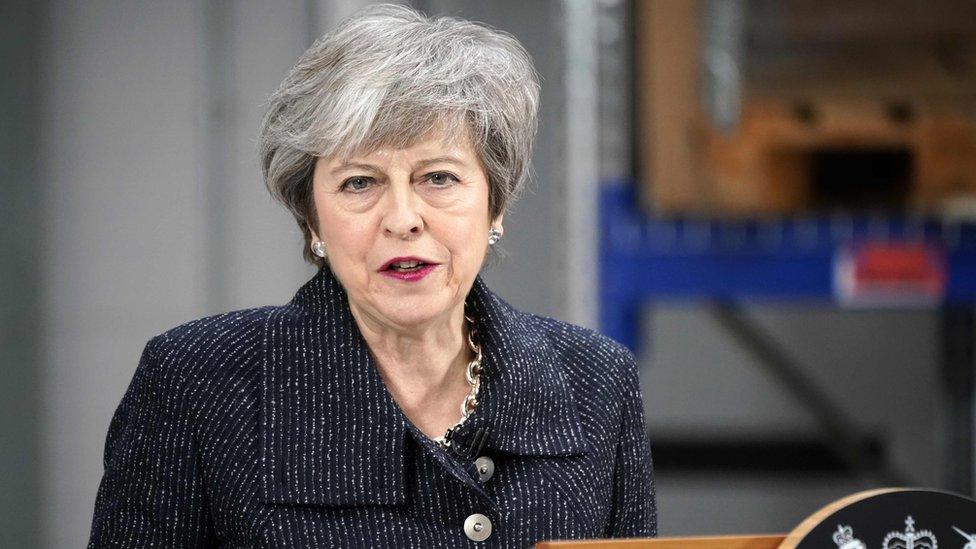
Prime Minister Theresa May has asked for the issue of knife crime to be dealt with as a priority
Mrs May also said the problem would require "a whole-of-government effort, in conjunction with the police, the wider public sector and local communities".
The UK's top police officer Cressida Dick has said: "Now is the time for all of us - the public in our communities, across London, across the country, politicians - to say to ourselves 'What else can be done? What can we do to prevent young people getting involved with knife crime?'"
Manchester City captain Vincent Kompany has voiced his opinion too, saying that young people need "the right amount of education and support at every level" to help prevent knife crime.
WATCH: Vincent Kompany says education can help stop knife crime
In March 2018, it was announced that a series of adverts aimed at 10 to 21-year-olds - paid for by the government - would would be put on social media and digital channels to try to make young people more aware of the dangers of knife crime. Posters would also be put up in cities in England where knife crime is more common.
Patrick Green, head of the Ben Kinsella Trust (a charity that works to tackle knife crime), said it is "vitally important" that young people understand the dangers associated with carrying a knife.
Many charities and organisations continue to work hard to raise awareness of the dangers of knife crime and - along with all of those working to tackle the issue - hope that this increase will soon be reversed.
WATCH: Advice if you're upset by the news
Scotland and Northern Ireland deal with their own policing and criminal justice, which is why the figures in this article are about England and Wales.
- Published29 August 2022

- Published29 November 2012
